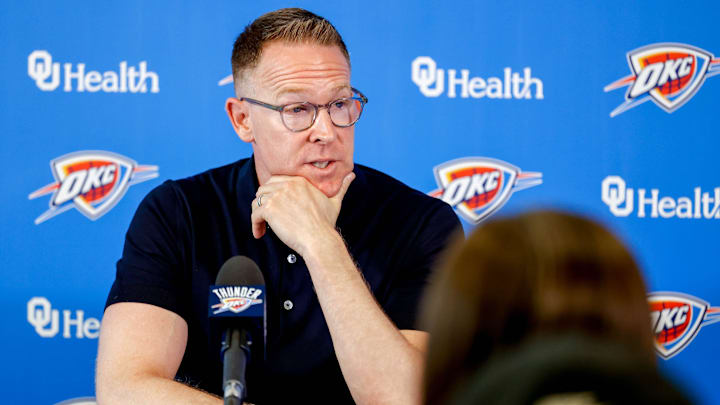The OKC Thunder committed an exorbitant amount of money in new, standard contracts this summer, especially in their efforts to keep their core trio of Shai Gilgeous-Alexander, Jalen Williams, and Chet Holmgren together for the long haul.
Yet, despite this coinciding with an evolving era of tax penalties, the organization is more than capable of avoiding things like the dreaded second apron, and the Dillon Jones trade from a couple of months back served as a perfect example of how.
Thunder have enough picks to make almost everyone expendable
Just a week after winning the 2025 NBA Finals and a few days following the 2025 NBA Draft, Sam Presti and company opted to part ways with their 26 pick from the 2024 draft by sending him to the Washington Wizards in exchange for guard Colby Jones, who was immediately waived.
The reasoning behind the move should now be crystal clear, as it ultimately opened up a roster spot for the Thunder that they then used to sign the 15 overall pick from this past June's festivities, Thomas Sorber.
On top of this being a highly strategic transaction on its own, as it essentially swapped a lesser-utilized player for much-needed depth down at the pivot, the way in which they moved on from Jones serves as a primary example of how, exactly, the Thunder can dodge crippling tax penalties moving forward while other teams like the Boston Celtics, for instance, face their unforgiving wrath.
Between now and 2031, after offloading Houston's 2029 second-round draft pick in the Jones exchange, Oklahoma City is set to have upward of 29 total draft picks in their possession, 13 of which could fall in the first round.
With these luxuries, many experts anticipate that as the team's salary begins to rise once the max extensions to SGA, J-Dub, and Chet kick in, Presti and company will use them to find replacement options for some of the higher-priced, non-core talents.
Guys like Isaiah Hartenstein and Kenrich Williams are already seen as heading into lame duck campaigns in 2025-26, while, painfully, Luguentz Dort could also become a cap casualty, all because of the new CBA.
The idea is that, in response to any of these potential departures, OKC would then select someone of a similar skill set or position at a much more coveted, rookie-scale price tag, which, in turn, would keep costs below the second-apron while simultaneously still surrounding their star trio with a quality supporting cast.
Though the exchange that saw Jones be sent to the Wizards and had his roster spot taken over by Sorber may have been different in principle, as roster fit, not finances, were the driving force in the decision, it is the practice that's going to play a huge role in the Thunder remaining a consistent title contender over the many years to come and, hopefully, turn them into a dynasty.
